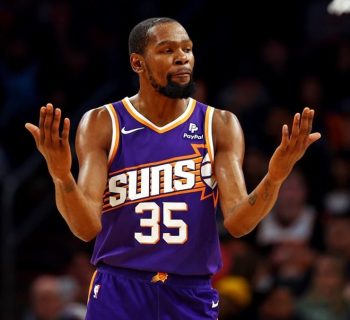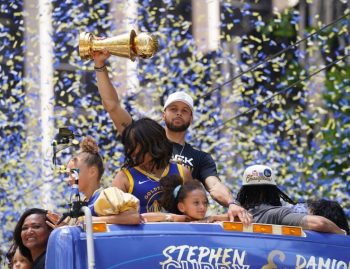NBA
NBA AM: What To Do At #12?

Certain bits of unforeseen success in the 2014-15 season have left the Utah Jazz in a very different position than most expected a year ago. The effect was twofold: by well exceeding win projections, the Jazz not only accelerated their developmental timetable moving forward, but did so while pushing their pick from the early-to-mid lottery back to No. 12.
In the eyes of many, this may no longer be a franchise in need of adding any more high-upside talent. With Gordon Hayward, Derrick Favors, Rudy Gobert, Alec Burks, Dante Exum and Rodney Hood all on board and this core rolling over much of the league during the latter half of the season, it’s a fair viewpoint. Others think the Jazz are at least one more young stalwart away from true contention, and there are plenty of opinions in between.
So what should the Jazz do with the 12th pick, which certainly holds value but may or may not be best served in the Jazz’s hands? Let’s lay out all the options on the table.
Trade Down
Jazz brass ignited a whole bevy of trade discussions among prognosticators when, both privately and publicly, they confirmed a couple months ago that the team would explore the possibility of trading the 12th pick as part of a package for veteran, on-court reinforcements. There’s always a team or two looking to clear salary or move particular players out of town, and often these same teams could find great use for a lottery pick, as many are in rebuilding mode.
Who the franchise might target with such a move could be intriguing, though their options might be limited somewhat if they wanted to retain a later first-round pick in the deal. Someone like Toronto’s Patrick Patterson has been discussed – he’s on a reasonable contract with multiple years left, can add some shooting from the 4-spot that the team could absolutely use, and might not be part of the long-term plan up north. Toronto has the 20th pick, and something based around Patterson and 20 in exchange for 12 (perhaps even that exact deal) could be amenable for both sides.
Others below Utah in the first round could have some interest in moving up, and teams like Boston, Houston, or maybe even Portland might have a few additional depth assets to make a deal work. If the Jazz have their eye on a few guys projected to fall into the later part of the first round and could nab a rotation player in exchange for their troubles, absolutely expect them to pursue this route. The brass under general manager Dennis Lindsey has nailed consecutive mid-20s picks (Hood and Gobert) and does as much scouting as any other team in the league, if not more. They’ll be confident in their board and could add depth without sacrificing much draft value.
Trade Up
It’s obviously less likely based simply on the exponentially larger cost to moving up the higher one gets in the lottery, but don’t rule this possibility out either. The Jazz know they have a solid core and would likely be fine continuing to improve it while adding the right complementary pieces (and maybe even another core veteran), but this certainly doesn’t mean they’d turn away from a potentially franchise-altering deal for a star prospect if the right one came up.
In particular, the Jazz are privately very high on Kristaps Porzingis (like many others), and in general seem eager to obtain shooting at one of the big positions. Could the right deal materialize for the fourth pick currently held by the Knicks, who have been open to moving the selection? It’s certainly far from impossible, though it would almost certainly require one of Favors or Hayward to be moved, and could be a sizable gamble along with a potential on-court step back in the short term.
They could also be interested in moving up a few less spots, into the 7-10 range or so, if the right guy on their board remains available there. Someone like Justise Winslow could be such a case, or there may be several others on their board. This is probably the least likely overall option, but it’s far from out of the question.
Trade Out
If the Jazz do move the 12th pick, this is the most likely route. The franchise could easily weather the lack of a first-round pick for this year and potentially others in the near future with much of their core already in place. If the right veteran is available and could be obtained without sacrificing much else in the way of vital future pieces, they’ll pounce.
A large point of controversy among Jazz fans and analysts alike has been the state of their point guard position, which was the worst in the NBA last year from a production standpoint. Dante Exum remains only 19 and isn’t going anywhere despite a rough rookie year, but Trey Burke will already be 23 by early next season and is coming off his second straight disappointing year. He’s dangerously close to playing his way out of NBA rotations, and it’s not unreasonable to wonder whether the Jazz might move on from him sooner rather than later.
For this reason, potential deals involving a veteran point guard have been a major talking point. Ty Lawson is mentioned frequently as a guy on the block in Denver who could improve Utah’s play significantly, though the Jazz are among the most careful franchises in the league regarding off-court minutiae like Lawson’s recent DUI and might be reticent to add someone who’s had issues in the locker room as well.
The Jazz could take bigger swings at someone like Jrue Holiday or George Hill, both of whom would be fantastic fits in coach Quin Snyder’s system as lead ball-handlers who are also capable and comfortable playing away from the ball for stretches. Both are great defenders at their position and would be huge upgrades over Burke, and both could share the court with Exum for potentially large stretches so as to not impede the young Aussie’s development minutes-wise. Of course, it’s possible neither New Orleans nor Indiana has any interest in moving such established players.
There could be many other possibilities here, including the other four positions on the court. Expect the Jazz to be active in the upcoming week and on draft night.
Keep the Pick
Despite all the above and a clear willingness to make moves if the right ones are there, the Jazz keeping and using the 12th selection remains the most likely overall outcome. It’s simply more difficult to make a trade than it is to not make one with all the details involved in even the “simplest” transactions.
The Jazz have worked out a ton of guys and have even more in their potential sights should they hold onto the pick. To this eye, should they remain available at 12, Wisconsin’s Frank Kaminsky and Texas’ Myles Turner may be at or near the top of the team’s board assuming no drastic drops. Both have potential as stretch bigs, and as mentioned above, the Jazz have serious interest in this sort of player.
I’ve been vocal about my opinion that Utah should select Kaminsky if he’s available despite concerns about his age and ceiling. What he brings to the table right now fits perfectly with what they Jazz do offensively, and he’d be a great change-of-pace big from a Favors-Gobert starting combo that bogs down on offense due to lack of spacing at times. He’s not at risk of getting roasted by bigger post talents if he plays 20 minutes a game, mostly against second units, and he’s got the ball-handling skills and basketball IQ to be a positive on offense right away.
There are plenty of other possibilities also in a draft that remains quite fluid up through the lottery. Arizona’s Stanley Johnson was initially assumed to be a top-seven selection or better, but has fallen in certain mocks in recent weeks and could be an intriguing option as a stretch four if he’s available. Kelly Oubre has a ton of raw talent and could be a steal in this range if his mental side pans out. Devin Booker is the youngest player in the draft, has solid upside on both sides of the ball and is one of the best pure shooters in the class.
None of these possibilities are long shots whatsoever. The Jazz are in a position as a franchise where several of the options outlined herein are totally realistic if circumstances fall the right way. There should be no shortage of Utah Jazz mentions in the NBA news feed over the next week leading up to draft day.













